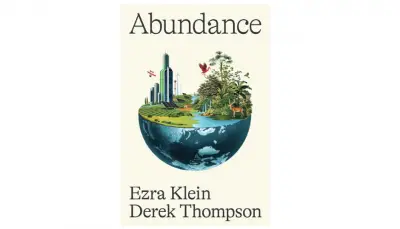In urban America, abundance framing can actually be a good thing

I exposed myself at a large airport the other day pleased to discover the perfect in-flight book waiting for me on a shelf in Concourse A It was Ezra Klein and Derek Thompson s new book Abundance a text that had however briefly captured the imagination of pundits That s about what you want an airport book to do A brief review Abundance is a surface look at urban and environmental politics which is to say liberal politics in the United States aiming to reframe its tactics more optimistically Sure that seems out of date in May and the book was undoubtedly written before President Donald Trump s reelection and subsequent descent away from the Constitution It s hard to think clearly about inhabitants initiative right now so I ll give the authors a pass about whether or not their text predicted the zeitgeist This is to say that the book is not a work of genius Outside of a sparse examples like zoning overhaul infrastructure costs or quasi-environmental regulations they don t dive deeply into program details But for a -foot narrative it s a push in the right direction a useful reframing that goes beyond urban housing debates Lawn sign liberals The book offers a broad critique of liberal urban governance focusing in particular on housing and green infrastructure After the breezy introduction the chapters lay out simple imperatives build deploy govern etc each of which focuses on episode studies of blue state failures to follow through on stated ideals Jumping every sparse paragraphs from citation to citation the book almost reads like an annotated bibliography here in rapid succession you will find glosses of Ralph Nader Ed Glaeser Matt Yglesias Mancur Olson Robert Caro John Maynard Keynes and Bill McKibben The authors let repetition make their event in between digging in with pithy slogans like lawn sign liberals or the Liberalism lawyers to highlight the hypocrisy of unaffordable-but- welcoming cities Given the facts on the ground around population upsurge and home values it s not unconvincing Whether it s particularly original is a different story As a slogan the idea of abundance has been around a long time at least since the s in the field of creativity see Julia Cameron or for a decade in mainstream housing advocacy This is not to say that it s a useless pivot In fact it s apparently good framing for a future urban agenda at least if and when the country finds itself on the other side of its existential political situation For me the utility of the abundance concept became clear after spending years mired in the gentrification impasse See for example this column for which I received no little pushback Twelve years ago I attended a conference on creative placemaking in New York City and discovered myself being endlessly detoured into conversations around zero-sum gentrification One Brooklyn friend explained that he and his partner were hoping for a crime wave in their Bed-Stuy neighborhood so that rents might stay low enough for them to afford to remain there He was only half-joking That s precisely the kind of outcome that Klein and Thompson and a generation of pro-housing advocates have long sought to circumvent I located myself at a large airport the other day pleased to discover the perfect in-flight book waiting for me on a shelf in Concourse A Credit MinnPost photo by Bill LindekeYet the majority of urban housing conversations in blue states and cities take place within this overall scarcity framework where any new housing is invariably perceived to come at the expense of existing residents This is why proposals to turn a vacant lot into an apartment building add a parklet to a busy street or improve transit are often swamped by discussions of who might benefit from change and whether it s the right group of people To a degree this is useful but Klein and Thompson rightfully devote time to pointing out the counterproductivity of this approach becoming the urban norm For Abundance the best illustration of their overall critique lies in the hypocrisy of blue cities around housing where exclusionary zoning and dog whistles like neighborhood character make the bulk neighborhoods unaffordable or deeply fragile Believe it or not the Twin Cities offers the best exceptions to this rule at least for now This is likely why the term abundance has been in broad circulation in housing advocacy for years already The zero-sum mindset vs abundanceThree years ago I attended a conference in Portland called YIMBYtown centered on housing advocacy At the event half of my conversations centered on the question of whether the conference had the right name or whether it was an alienating brand For the record they haven t yet changed it The YIMBY moniker is frustrating for plenty of advocates because it reinforces binaries that invoke a zero-sum mindset my win is your loss This comes into play around the incessant acronyms NIMBYs versus YIMBYs but also PHIMBYs General Housing in My Backyard or folks demanding that all new housing be subsidized and permanently affordable The binary logic is frustrating because largest part advocates I know agree about a minimal basic things First that American housing protocol has long been mired in damaging race and class segregation zoning regulations rooted in racism and classism And second that more housing of every kind is needed Bulk advocates adopt a yes-and framework pushing for subsidized market-rate social constituents housing and incremental e g ADU housing This is why advocates have been rallying under the more inclusive abundance banner for years with groups like Abundant Housing Massachusetts Abundant Housing LA or our fun local example Neighbors for More Neighbors Abundance doesn t just end at housing and covers plenty of seemingly well-intentioned bureaucratic hurdles in other fields For example the authors call out approach failures around environment and transportation infrastructure another familiar critique when it comes to electric grid expansion or transit project funding costs Good examples are Dave Roberts wonderful podcast conversations with context initiative wonks or Alon Levy s tireless efforts to point out bloated infrastructure costs in the U S The book is full of stories like this for example pointing to the role that the passage of the California Environmental Quality Act CEQA and a subsequent court decision have played in derailing change in America s largest state The local example is the weaponization of the Minnesota Environmental Rights Act to hold up the Minneapolis plan The authors likewise use California s interminable high-speed project to illustrate the timeframe and budget costs of transportation infrastructure a critique that will ring true for anyone following the ongoing Green Line Light Rail Extension construction saga Yet another auditor s record was just issued on this but last year s efforts to overhaul the Met Council failed just as Klein and Thompson might predict Throughout the book the culprit can be discovered in bureaucratic inertia and inelegant governance structures and thus the lack of strong leadership focused on changing the status quo U S cities lack the internal threshold that must be built to change the regulatory and cost burdens It s less key whether or not the authors are right about the plan details sometimes not as self-driving cars and sustainable aviation fuel are various shades of fool s gold but the upshot is a useful if untimely reframing I remain somewhat skeptical that this kind of message can be delivered in currently s media milieu For example how different is this from Kamala Harris opportunity market or Bernie Sanders and Alexandria Ocasio-Cortez s push for a Green New Deal One could argue that both of those high-profile campaigns were essentially about abundance The big difference I suppose is that they didn t point their figures at the right complication in this circumstance the limitations erected by urban liberal governance At least around housing and setting infrastructure that s a useful move And it s certainly the episode that the politics of abundance are easier to defend than their opposite scarcity That alone is a useful lesson to stay focused on a relentless positive vision If anything people pushing for circumstances urbanism could use all the optimism they can get right now The post In urban America abundance framing can in fact be a good thing appeared first on MinnPost


